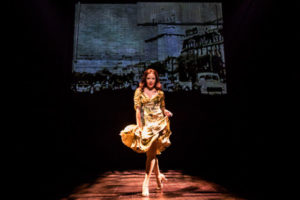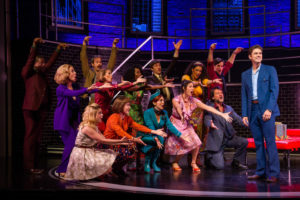 Glenn Gould plays Beethoven’s Thirty-Two Variations on an Original Theme in C Minor on the CBC in 1966:
Glenn Gould plays Beethoven’s Thirty-Two Variations on an Original Theme in C Minor on the CBC in 1966:
(This is the latest in a series of arts-related videos that appear in this space each Monday, Wednesday, and Friday)
Terry Teachout on the arts in New York City
 I rarely write straight literary criticism nowadays, so I jumped at the chance to get back in the game when National Review invited me to review two new biographies of F. Scott Fitzgerald and Ernest Hemingway:
I rarely write straight literary criticism nowadays, so I jumped at the chance to get back in the game when National Review invited me to review two new biographies of F. Scott Fitzgerald and Ernest Hemingway:
The trouble with Hemingway, seen from the privileged vantage point of hindsight, is that he looks increasingly like a great influence but not a great author in his own right. No 20th-century writer would leave a deeper mark on his contemporaries, and as late as 1948, Evelyn Waugh, no respecter of reputations, unhesitatingly described him in print as “one of the most original and powerful of living writers.” Yet all but the very finest of his short stories now sound mannered and artificial, while the novels come off as little more than sustained exercises in mirror-gazing and pose-striking….
Fitzgerald, like so many moralists, knew that he was himself exemplary of the flaws of the culture whose frivolity he chronicled and indicted. This knowledge is the source of the gravity that heightens the force of his best work, whose lightness of touch cannot conceal its ultimate seriousness, a seriousness that makes the Hemingway of The Sun Also Rises and A Farewell to Arms look like a mere merchant of self-pity by comparison….
Read the whole thing here.
As I’ve said before, we’re trying to write a cross between a verismo opera like Tosca and a film noir like Double Indemnity or Out of the Past. We don’t want The Letter to sound old-fashioned—Paul’s musical language is in no way derivative of Verdi or Puccini—but we do want it to move fast and hit hard….
Read the whole thing here.
 Edward Villella and New York City Ballet dance Oberon’s solo from George Balanchine’s A Midsummer Night’s Dream in a 1966 film version of the complete ballet, directed by Dan Eriksen. The score, conducted by Robert Irving, is by Felix Mendelssohn:
Edward Villella and New York City Ballet dance Oberon’s solo from George Balanchine’s A Midsummer Night’s Dream in a 1966 film version of the complete ballet, directed by Dan Eriksen. The score, conducted by Robert Irving, is by Felix Mendelssohn:
(This is the latest in a series of arts-related videos that appear in this space each Monday, Wednesday, and Friday)
In today’s Wall Street Journal I review the Broadway opening of Prince of Broadway and an important regional revival of Company. Here’s an excerpt.
* * *
 Anyone with a more than casual interest in theater needs no reminding that Harold Prince directed the original Broadway productions of “She Loves Me,” “Cabaret,” “Follies,” “A Little Night Music,” “Sweeney Todd,” “Evita,” “The Phantom of the Opera” and “Kiss of the Spider Woman.” That’s a staggering track record by any conceivable standard. Nevertheless, he isn’t exactly a household name west of the Hudson and hasn’t had a hit since the 1994 revival of “Show Boat,” so you can’t help but wonder how savvy a commercial proposition it was for the 89-year-old legend to put together a tribute to himself and call it “Prince of Broadway.”
Anyone with a more than casual interest in theater needs no reminding that Harold Prince directed the original Broadway productions of “She Loves Me,” “Cabaret,” “Follies,” “A Little Night Music,” “Sweeney Todd,” “Evita,” “The Phantom of the Opera” and “Kiss of the Spider Woman.” That’s a staggering track record by any conceivable standard. Nevertheless, he isn’t exactly a household name west of the Hudson and hasn’t had a hit since the 1994 revival of “Show Boat,” so you can’t help but wonder how savvy a commercial proposition it was for the 89-year-old legend to put together a tribute to himself and call it “Prince of Broadway.”
On the other hand, “Prince of Broadway” is not a budget-pulverizing extravaganza à la “Jerome Robbins’ Broadway” but a nine-singer revue at the 650-seat Samuel J. Friedman Theatre, which is a thousand seats smaller than the nearby house where “Phantom” has been minting money for the past 29 years. That Mr. Prince tried and failed to raise the money to put on a bigger, starrier show is no secret. Instead, he and Susan Stroman, his choreographer and co-director, have settled for a modestly scaled, slickly staged two-and-a-half-hour greatest-hits medley of numbers from 16 of the shows that Mr. Prince has directed and/or produced since 1955. Modest though it is, “Prince of Broadway” looks and sounds fabulous….
“Prince of Broadway” adds up to a pleasingly intimate musical revue full of shining moments, albeit one that feels rather more like a pledge-week TV special than a full-fledged Broadway show….
 One of the first musicals that Mr. Prince directed was, of course, Stephen Sondheim’s “Company,” and Barrington Stage Company, which has emerged in recent seasons as one of America’s top regional musical-comedy producers, is currently mounting a stirring revival of Mr. Sondheim’s now-classic study of the problems of postmodern marriage. Directed by Julianne Boyd, it stars Aaron Tveit as Robert, the commitment-phobic New York bachelor whose role was created by Dean Jones in the original 1970 production. I doubt there’s been a better Robert since Mr. Jones left the show. A true tenor with brilliantly gleaming high notes, Mr. Tveit is also a superior actor…
One of the first musicals that Mr. Prince directed was, of course, Stephen Sondheim’s “Company,” and Barrington Stage Company, which has emerged in recent seasons as one of America’s top regional musical-comedy producers, is currently mounting a stirring revival of Mr. Sondheim’s now-classic study of the problems of postmodern marriage. Directed by Julianne Boyd, it stars Aaron Tveit as Robert, the commitment-phobic New York bachelor whose role was created by Dean Jones in the original 1970 production. I doubt there’s been a better Robert since Mr. Jones left the show. A true tenor with brilliantly gleaming high notes, Mr. Tveit is also a superior actor…
Role for role, this is the best-sung “Company” I’ve ever heard—not just in regional theater, but anywhere….
* * *
Read the whole thing here.
Highlights from the original 2015 Japanese production of Prince of Broadway:
A video of a rehearsal for Barrington Stage’s revival of Company:
| M | T | W | T | F | S | S |
|---|---|---|---|---|---|---|
| 1 | 2 | |||||
| 3 | 4 | 5 | 6 | 7 | 8 | 9 |
| 10 | 11 | 12 | 13 | 14 | 15 | 16 |
| 17 | 18 | 19 | 20 | 21 | 22 | 23 |
| 24 | 25 | 26 | 27 | 28 | 29 | 30 |
| 31 | ||||||
An ArtsJournal Blog